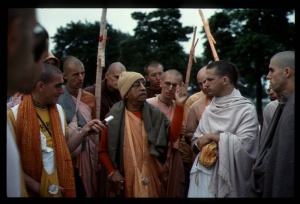CC Madhya 19.72 (1975): Difference between revisions
(Vanibot #0027: CCMirror - Mirror CC's 1996 edition to form a basis for 1975) |
(Vanibot #0020: VersionCompareLinker - added a link to the Version Compare feature) |
||
| Line 2: | Line 2: | ||
<div style="float:left">'''[[Sri Caitanya-caritamrta (1975)|Śrī Caitanya-caritāmṛta (1975)]] - [[CC Madhya (1975)|Madhya-līlā]] - [[CC Madhya 19 (1975)|Chapter 19: Lord Śrī Caitanya Mahāprabhu Instructs Śrīla Rūpa Gosvāmī]]'''</div> | <div style="float:left">'''[[Sri Caitanya-caritamrta (1975)|Śrī Caitanya-caritāmṛta (1975)]] - [[CC Madhya (1975)|Madhya-līlā]] - [[CC Madhya 19 (1975)|Chapter 19: Lord Śrī Caitanya Mahāprabhu Instructs Śrīla Rūpa Gosvāmī]]'''</div> | ||
<div style="float:right">[[File:Go-previous.png|link=CC Madhya 19.71 (1975)|Madhya-līlā 19.71]] '''[[CC Madhya 19.71 (1975)|Madhya-līlā 19.71]] - [[CC Madhya 19.73 (1975)|Madhya-līlā 19.73]]''' [[File:Go-next.png|link=CC Madhya 19.73 (1975)|Madhya-līlā 19.73]]</div> | <div style="float:right">[[File:Go-previous.png|link=CC Madhya 19.71 (1975)|Madhya-līlā 19.71]] '''[[CC Madhya 19.71 (1975)|Madhya-līlā 19.71]] - [[CC Madhya 19.73 (1975)|Madhya-līlā 19.73]]''' [[File:Go-next.png|link=CC Madhya 19.73 (1975)|Madhya-līlā 19.73]]</div> | ||
{{CompareVersions|CC|Madhya 19.72|CC 1975|CC 1996}} | |||
{{RandomImage}} | {{RandomImage}} | ||
==== TEXT 72 ==== | ==== TEXT 72 ==== | ||
<div class="verse"> | <div class="verse"> | ||
:aho bata śva-paco | :aho bata śva-paco 'to garīyān | ||
:yaj-jihvāgre vartate nāma tubhyam | :yaj-jihvāgre vartate nāma tubhyam | ||
:tepus tapas te juhuvuḥ sasnur āryā | :tepus tapas te juhuvuḥ sasnur āryā | ||
| Line 20: | Line 19: | ||
<div class="synonyms"> | <div class="synonyms"> | ||
duṅhāra mukhe—in the mouths of both; kṛṣṇa-nāma—the holy name of Lord Kṛṣṇa; kariche—is doing; nartana—dancing; ei-dui—both of them; adhama nahe—not fallen; haya—are; sarva-uttama—the most exalted. | |||
</div> | </div> | ||
| Line 27: | Line 26: | ||
<div class="translation"> | <div class="translation"> | ||
Vallabha Bhaṭṭācārya | Vallabha Bhaṭṭācārya admitted, "Since these two are constantly chanting the holy name of Kṛṣṇa, how can they be untouchable? On the contrary, they are most exalted." | ||
</div> | </div> | ||
| Line 34: | Line 33: | ||
<div class="purport"> | <div class="purport"> | ||
Vallabha Bhaṭṭācārya's admission of the brothers' exalted position should serve as a lesson to one who is falsely proud of his position as a brāhmaṇa. Sometimes so-called brāhmaṇas do not recognize our European and American disciples as devotees or brāhmaṇas, and some brāhmaṇas are so proud that they do not allow them to enter temples. Śrī Caitanya Mahāprabhu herein gives a great lesson. Although Vallabha Bhaṭṭācārya was a great authority on brahmanism and a learned scholar, he admitted that those who chant the Lord's holy name are bona fide brāhmaṇas and Vaiṣṇavas and are therefore exalted. | |||
</div> | </div> | ||
Latest revision as of 12:14, 27 January 2020

A.C. Bhaktivedanta Swami Prabhupada
TEXT 72
- aho bata śva-paco 'to garīyān
- yaj-jihvāgre vartate nāma tubhyam
- tepus tapas te juhuvuḥ sasnur āryā
- brahmānūcur nāma gṛṇanti ye te
SYNONYMS
duṅhāra mukhe—in the mouths of both; kṛṣṇa-nāma—the holy name of Lord Kṛṣṇa; kariche—is doing; nartana—dancing; ei-dui—both of them; adhama nahe—not fallen; haya—are; sarva-uttama—the most exalted.
TRANSLATION
Vallabha Bhaṭṭācārya admitted, "Since these two are constantly chanting the holy name of Kṛṣṇa, how can they be untouchable? On the contrary, they are most exalted."
PURPORT
Vallabha Bhaṭṭācārya's admission of the brothers' exalted position should serve as a lesson to one who is falsely proud of his position as a brāhmaṇa. Sometimes so-called brāhmaṇas do not recognize our European and American disciples as devotees or brāhmaṇas, and some brāhmaṇas are so proud that they do not allow them to enter temples. Śrī Caitanya Mahāprabhu herein gives a great lesson. Although Vallabha Bhaṭṭācārya was a great authority on brahmanism and a learned scholar, he admitted that those who chant the Lord's holy name are bona fide brāhmaṇas and Vaiṣṇavas and are therefore exalted.